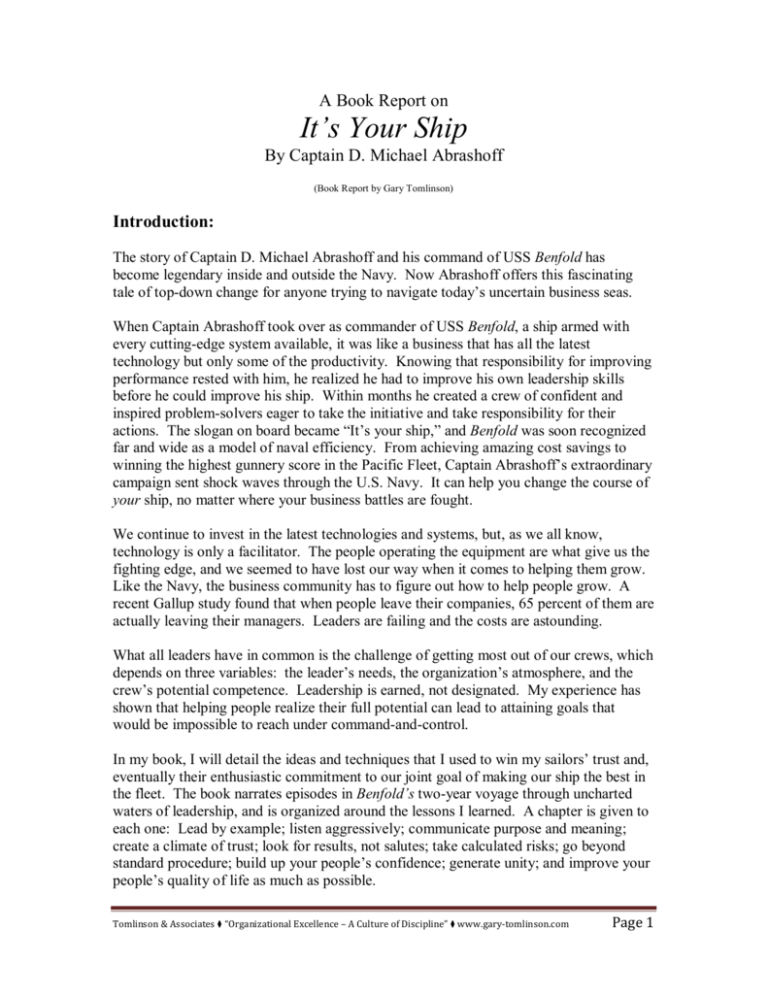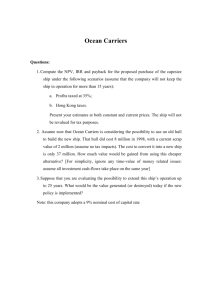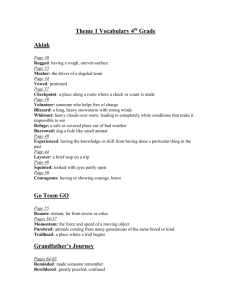Book Report - It's Your Ship
advertisement

A Book Report on It’s Your Ship By Captain D. Michael Abrashoff (Book Report by Gary Tomlinson) Introduction: The story of Captain D. Michael Abrashoff and his command of USS Benfold has become legendary inside and outside the Navy. Now Abrashoff offers this fascinating tale of top-down change for anyone trying to navigate today’s uncertain business seas. When Captain Abrashoff took over as commander of USS Benfold, a ship armed with every cutting-edge system available, it was like a business that has all the latest technology but only some of the productivity. Knowing that responsibility for improving performance rested with him, he realized he had to improve his own leadership skills before he could improve his ship. Within months he created a crew of confident and inspired problem-solvers eager to take the initiative and take responsibility for their actions. The slogan on board became “It’s your ship,” and Benfold was soon recognized far and wide as a model of naval efficiency. From achieving amazing cost savings to winning the highest gunnery score in the Pacific Fleet, Captain Abrashoff’s extraordinary campaign sent shock waves through the U.S. Navy. It can help you change the course of your ship, no matter where your business battles are fought. We continue to invest in the latest technologies and systems, but, as we all know, technology is only a facilitator. The people operating the equipment are what give us the fighting edge, and we seemed to have lost our way when it comes to helping them grow. Like the Navy, the business community has to figure out how to help people grow. A recent Gallup study found that when people leave their companies, 65 percent of them are actually leaving their managers. Leaders are failing and the costs are astounding. What all leaders have in common is the challenge of getting most out of our crews, which depends on three variables: the leader’s needs, the organization’s atmosphere, and the crew’s potential competence. Leadership is earned, not designated. My experience has shown that helping people realize their full potential can lead to attaining goals that would be impossible to reach under command-and-control. In my book, I will detail the ideas and techniques that I used to win my sailors’ trust and, eventually their enthusiastic commitment to our joint goal of making our ship the best in the fleet. The book narrates episodes in Benfold’s two-year voyage through uncharted waters of leadership, and is organized around the lessons I learned. A chapter is given to each one: Lead by example; listen aggressively; communicate purpose and meaning; create a climate of trust; look for results, not salutes; take calculated risks; go beyond standard procedure; build up your people’s confidence; generate unity; and improve your people’s quality of life as much as possible. Tomlinson & Associates ⧫ “Organizational Excellence – A Culture of Discipline” ⧫ www.gary-tomlinson.com Page 1 “It’s your ship.” Show me an organization in which employees take ownership, and I will show you one that beats its competitors. Many people consider going out on a limb a sure way to endanger your career, but this conventional wisdom is no way for an organization to stay alive and strong. Organizations should reward risk-takers, even if they fall short once in a while. Let them know that promotions and glory go to innovators and pioneers, not to stand-patters who fear controversy and avoid trying to improve anything. To me, that’s the key to keeping an organization young, vital, growing, and successful. Stasis is death to any organization. Evolve or die. I decided on just about everything I did, my standard would be simply whether or not it felt right. You can never go wrong if you do “the right thing.” Take Command: Being likable is not high among a ship captain’s job requirements. What is essential is to be respected, trusted, and effective. A challenge for leaders in the twenty-first century is attracting and retaining not just employees, but the best employees – and more important, how to motivate them so that they work with passion, energy, and enthusiasm. But very few people with brains, skills, and initiative appear. The timeless challenge in the real world is to help less-talented people transcend their limitations. I read some exit surveys to find out why people are leaving the Navy. I assumed that low pay would be the first reason, but in fact it was fifth. The top reason was not being treated with respect or dignity; second was being prevented from making an impact on the organization; third, not being listened to; and fourth, not being rewarded with more responsibility. My organizing principle was simple: The key to being a successful skipper is to see the ship through the eyes of the crew. Only then can you find out what’s really wrong and, in so doing, help the sailors empower themselves to fix it. I began with the idea that there is always a better way to do things, and that, contrary to tradition the crew’s insights might be more profound than even the captain’s. My second assumption was that the secret to lasting change is to implement processes that people will enjoy carrying out. As in business, no one person can stay on top of it all. I realized that no one, including me, is capable of making every decision. I would have to train my people to think and make judgments on their own. Empowering means defining the parameters in which people are allowed to operate, and then setting them free. As I saw it, my job was to create the climate that enabled people to unleash their potential. Given the right environment, there are few limits to what people can achieve. Tomlinson & Associates ⧫ “Organizational Excellence – A Culture of Discipline” ⧫ www.gary-tomlinson.com Page 2 Lead By Example: Real leadership must be done by example, not precept. Whenever I could not get the results I wanted, I swallowed my temper and turned inward to see if I was part of the problem. I asked myself three questions: 1. Did I clearly articulate the goals? 2. Did I give people enough time and resources to accomplish the task? 3. Did I give them enough training? I discovered that 90 percent of the time, I was at least as much a part of the problem as my people were. Never forget your effect on people. Leaders need to understand how profoundly they affect people, how their optimism and pessimism are equally infectious, how directly they set the tone and spirit of everyone around them. Show me an enthusiastic leader, and I will show you an enthusiastic workforce. And vice versa: If the leader has a bad day, the whole organization has a bad day. Never fail the Washington Post test. I was always careful never to take any ethical shortcuts. My self-test was simple, and it allowed me to decide whether to go or stop in terms of obvious consequences. I just asked myself this: If what I’m about to do appeared on the front page of the Washington Post tomorrow, would I be proud or embarrassed? If I knew I would be embarrassed, I would not do it. If I’d be proud, I knew I was generally on the right track. Getting somewhere is important. How you get there is equally important. Do the right thing. Forget petty politics, don’t worry about whether you’re going to upset anyone or ruffle anyone’s feathers; if it is the right thing to do, figure out a way to get past the egos, a way to get around the bureaucratic infighting, and then do it. Obey even when you disagree. Every so often your chain of command comes up with a policy that you disagree with – yet it’s your responsibility to enforce it. It’s important to make your objections known in a private manner with your bosses. But if you lose your argument, it’s also important that you carry out that order as if you supported it 100 percent. It’s important that you not undermine your superiors. In any organization, your people need to know that you support your chain of command. If they see you freelancing, they will feel free not to support you when they disagree with your policies. When I was given a task I did not agree with, I would sometimes ask my people if they thought there was a better way to accomplish the goals that my boss had set. There is nothing wrong with trying to offer a better way to meet a requirement that has been imposed on you. My superiors appreciated my honesty. If I could come up with an improvement, they usually listened to me. In the end, they got credit for the accomplishment – which suited me just fine. It gave them the best possible reason for doing what I wanted to do. Tomlinson & Associates ⧫ “Organizational Excellence – A Culture of Discipline” ⧫ www.gary-tomlinson.com Page 3 Listen Aggressively: See the ship through the crew’s eyes. Find round people for round holes. Give me performance over seniority any day of the week. Use the power of word magic. If leaders back their words with action, if they practice what they preach, their words create a self-fulfilling prophecy. Call it “word magic.” I wanted my people to believe that the USS Benfold was “the best ship in the Navy.” I wanted my people to believe in themselves. Sure, it was corny. But it worked, because confidence is infectious. If we weren’t actually the best just yet, we were certainly on our way there. Communicate Purpose and Meaning: The whole secret of leading a ship or managing a company is to articulate a common goal that inspires a diverse group of people to work hard together. We must give our employees a compelling vision of their work, a good reason to believe it was important. Make your crew think “we can do anything.” Our whole ship became a medium, sending a message of achievement and can-do optimism to the entire fleet. Like any other workforce, mine appreciated hearing from top management. Change frightens workers, and their fears thrive in silence. The antidote is obvious: Keep talking. Tell everyone personally what’s in store for him or her – new goals, new work descriptions, new organizational structure, and yes, job losses, if that’s the case. Explain why the company is making the changes. People can absorb anything if they are not deceived or treated arrogantly. I found that the more people knew what the goals were, the better buy-in I got – and the better results we achieved together. Open up the clogged channels. I focused on creating communication that actually conveyed information. There is a direct relationship between how much the crew knew about a plan and how well they carried it out. After creating a great brand, defend it. Freedom creates discipline. When people saw me opening myself to criticism, they opened themselves up. That’s how we made dramatic improvements. When people feel they own an organization, they perform with greater care and devotion. They want to do things right the first time, and they don’t have accidents by taking shortcuts for the sake of expedience. I am absolutely convinced that with good leadership, freedom does not weaken discipline – it strengthens it. Free people have a powerful incentive not to screw up. Create a Climate of Trust: The best way to keep a ship – or any organization – on course for success is to give the troops all the responsibility they can handle and then stand back. Trust is a human marvel – it not only sustains the social contract, it’s the growth hormone that turns green sailors into seasoned shipmates and troubled companies into dynamic competitors. Tomlinson & Associates ⧫ “Organizational Excellence – A Culture of Discipline” ⧫ www.gary-tomlinson.com Page 4 But trust is a kind of jujitsu: You have to earn it, and you earn trust only by giving it. Here are the hard lessons I learned. Never pit dog against dog. When the entire organization wins, everyone in it wins. Not one need be a loser. Even the worst screwup may be redeemable. Send a message to the rest of your crew that says “you may screw up, but we believe in comebacks. We will help and not give up on you.” Leaders and managers need to understand that their employees are keenly attuned to their actions and reactions. If they see you give up on someone, they understand instantly that there’s no room for redemption in this outfit, and they could be next to go. If they see you intervene to help someone who is worth your effort, they will be reassured. Though the process is tedious and time-consuming, you will benefit if people feel more secure, are more willing to take risks, and have a positive attitude about the organization. Guess who benefits most? You! Welcome the bad-news messenger. It’s critical that leaders don’t shoot the messenger who brings bad news. You should never bring petty problems to the attention of your boss if you can solve them yourself. But in critical situations, I advise the opposite. Bad news does not improve with age. Protect your people from lunatic bosses. Some bosses are heartless yet effective, and you have no choice but to endure them until they self-destruct or retire. Others, however, are much worse and should not be tolerated. I recognize fully that shielding your people from such a senior is excruciatingly painful and requires moral courage, but if the danger is clear and present, failure to act is moral cowardice. Being the best carries responsibility. Quite simply, we are the best. And being the best carries with it responsibility. Thank you for hanging in there. Look for Results, not Salutes: As captain, I was charged with enforcing 225 years of accumulated Navy regulations, policies, and procedures. But every last one of those rules was up for negotiation whenever my people came up with a better way of doing things. Let your crew feel free to speak up. You need to have people in your organization that can tap you on your shoulder and say, “Is this the best way? or “Slow down,” or “Think about this,” or “Is what we are doing worth killing or injuring somebody?” When leaders and managers behave as though they are above their people, when they announce decisions after little or no consultation, when they make it clear that their orders aren’t to be questioned, then conditions are ripe for disaster. The good news is that every leader Tomlinson & Associates ⧫ “Organizational Excellence – A Culture of Discipline” ⧫ www.gary-tomlinson.com Page 5 has the power to prevent this. Once leadership opportunities are squandered, you can never get them back. Free you crew from top-down-it is. I was determined to turn the ship into an institution of continual learning, which entailed a systematic and methodical analysis of what worked and what didn’t. My crew was going to be trained to make decisions. Few skills are more vital or would benefit them and their organizations more than that one, no matter where life took them. Nurture the freedom to fail. In the business community today, “empowerment” seems to be a four-letter word, but that’s because it is misunderstood to mean letting your people do whatever they want. Empower your people, and at the same time give them guidelines within which they are allowed to roam. I called it my line in the sand: I had to be in on any decision that could kill someone, injure someone, waste taxpayers’ money, or damage the ship. But short of that, anyone on my ship should try to solve any problem that came up. Trying takes grit, builds skills, breeds courage. All managers should nurture the freedom to fail. Take Calculated Risks: The U.S. Navy is no more fond of people who go out on a limb than is any other bureaucracy. In fact, taking a risk is seen as a danger to your career. But an organization that aims to stay alive and strong should make sure to praise and promote risk-takers, even if they fail once in a while. Unfortunately, organizations all too often promote only those who have never made a mistake. Show me someone who has never made a mistake, and I will show you someone who is not doing anything to improve your organization. Bet on the people who think for themselves. If all you give are orders, then all you will get are order-takers. If a rule doesn’t make sense, break it. Go Beyond Standard Procedure: In the Navy, as in business, SOP – Standard Operating Procedure – tends to rule. After all, it’s standard – safe, proven, effective. You will seldom get in trouble for following standard operating procedure. On the other hand, you will rarely get outstanding results. Innovation and progress are achieved only by those who venture beyond standard operating procedures. You have to think imaginatively, but realistically, about what may lie ahead, and prepare to meet it. You have to look for new ways to handle old tasks and fresh approaches to new problems. Tomlinson & Associates ⧫ “Organizational Excellence – A Culture of Discipline” ⧫ www.gary-tomlinson.com Page 6 Keep your priorities in focus. In battle, our initial reaction can often be the difference between success and failure, life and death. We also need to apply the successes and mistakes of others to our own situation and learn from them. If you prepare for the most challenging scenarios, chances are good that you will be much better prepared for the unforeseen. Stay ahead of the competition. In competition, one ship is going to do better than the competition. The point is to be sure to take responsibility as the CO, because how well the crew is prepared and how well it performs typically is a reflection of how well the CO leads. Don’t work harder work smarter. I realized, first-hand, the power of information. Those that have it prosper. Those that don’t, wither. There is no downside to having employees who know how every division of an organization functions. The challenge is finding incentives to motivate them to want to do so. Build Up Your People: Leadership is mostly the art of doing simple things very well. I prefer to build myself up by strengthening others and helping them feel good about their jobs and themselves. When that happens, their work improves, and my own morale leaps. I focused on building self-esteem. I know that most of us carry around an invisible backpack full of childhood insecurities. I could make the load heavier or lighter. Instead of tearing people down to make them into robots, I tried to show them that I trusted and believed in them. Show me a manager who ignores the power of praise, and I will show you a lousy manager. Praise is infinitely more productive than punishment – could anything be clearer? But how many managers give this fact more than lip service? How many really live it? Not enough. The same principle applies when you’re dealing with bosses. Never tear them down; help them grow strong. If you want to achieve anything in a large bureaucracy, get inside the bosses’ heads. Anticipate what they want before they know they want it. Take on their problems; make them look so good that you become indispensable. When they can’t get along without you, they will support nearly anything you seek to accomplish. Little things make big successes. We were attentive to people’s feelings and potential. A lot of seemingly small gestures added up to a friendly and supportive atmosphere. The more I went around meeting sailors, the more they talked to me openly and intelligently. The more I thanked them for hard work, the harder they worked. The payoff in morale was palpable. I’m absolutely convinced that positive, personal reinforcement is the essence of effective leadership. Yet some leaders seem to be moving away from it. They stay connected electronically with e-mail and cell phones, but they’re disconnected personally, and many leaders almost never leave their offices. People seem to think that if you send somebody a compliment on-line, it’s as good as the human touch. It is not. Tomlinson & Associates ⧫ “Organizational Excellence – A Culture of Discipline” ⧫ www.gary-tomlinson.com Page 7 It’s easier, but much less effective. Social interaction is getting lost in a digital world that trades more in abstractions than in face-to-face relations. It’s more than a shame – it’s a bottom line mistake. Trust people. They usually prove you’re right. Breaking out of our stratified systems to trust people who work for us, especially those at or near the low end of the hierarchy, is a useful, progressive change. It lets us unleash people with talent and lets them rise to levels that no one had expected, simply by challenging them. Newbies are important. Treat them well. All too often, a gung-ho newcomer runs smack into a poisoned corporate culture that sucks the enthusiasm right out of them. I wanted the newcomers to remain so revved up that they would recharge the batteries of those who no longer felt that way. Be the rising tide that lifts all boats. Jealousy and envy are powerful emotions and, if acted upon, can cause serious problems. Leaders must always watch out for them. A jealous commander may behave in ways that inhibit and soon paralyze his or her subordinates, who eventually turn off and tune out. The antidote lies in trying to make the people who work for you feel needed and highly valued. Help them believe in the wonderful old truism, “A rising tide lifts all boats.” With perhaps a few exceptions, every organization’s success if a collective achievement. Build up your bosses. I could not have succeeded by acting as a self-promoting careerist. Nothing alienates a boss faster than people who suck up, thirst for his or her job, or both. My mind-set was quite different: I aimed to be the consummate team player, a loyal servant to harassed bosses, whose needs I would anticipate before they even realized they had them. In the language of business, I would be a master of customer service. Expect the best from your crew. You will get it. How much brainpower – or any organization – waste because those in charge don’t recognize the full potential hiding at the low end of the hierarchy? If we stopped pinning labels on people and stopped treating them as if they were stupid, they would perform better. Why not instead assume that everyone is inherently talented, and then spur them to live up to those expectations? That’s exactly how Benfold became the best damn ship in the U.S. Navy. It is also the way leaders in every kind of organization can achieve new levels of success – by encouraging the people working for them to express themselves on both a personal and a professional level. Build a strong, deep bench. Cross-training became our mantra. By grooming people to move up and accept more responsibility, cross-training raised morale. By teaching them what their shipmates did, it improved team skills and spirit. Counsel continuously – and honestly. One of the most difficult tasks for any manager is counseling his or her employees at the yearly or semiannual evaluation. The key to a Tomlinson & Associates ⧫ “Organizational Excellence – A Culture of Discipline” ⧫ www.gary-tomlinson.com Page 8 successful evaluation is whether or not your people are surprised the day you give them their grades. If they’re surprised, then clearly you have not done a good job of setting their expectations and providing feedback throughout the entire year. If you’re communicating expectations and feedback on a continuous basis throughout the year, you will minimize, if not eliminate, people’s surprise when you give them the final evaluation. The key to being a good leader is ongoing counseling and consistent honesty. When it is time to inform the bottom performers that, in fact, that’s what they are, I have found that asking them how they would rate their own performances is effective. Most recognize that in relation to their peers, they are at the bottom of the curve. All managers must be ready to shed poor performers, but only after you have given them a chance; you must be open and honest with them. And finally, you must spell out the stick: what will happen if they don’t address those problems in a timely manner. Generate Unity: The task of the leader is to assemble the best team possible, train it, then figure out the best way to get the members to work together for the good of the organization. I can hire the smartest people around. But I have found what works best is a staff that works together and backstops one another. Treating people with dignity and respect is not only morally right, but also highly practical and productive. Unity became the fundamental purpose of my leadership model. Forget diversity, train for unity. There is no such thing as a truly level playing field, but we worked hard to make sure ours was as fair as possible. Everyone has strengths and weaknesses; no one is perfect, including the commanding officer. I would applaud their strengths and help them overcome their weaknesses, but above all, I wanted them to treat one another with dignity and respect. Unity is about maximizing uniqueness and channeling that toward the common goals of the group. Our unity training focused on common interests and positive reasons to value others instead of a top-down prohibition against devaluing them. It was the difference between being rewarded for good behavior and being punished for bad behavior. Deal out punishment strictly but fairly. I wanted people who screwed up on my ship to know two things: First, they will be appropriately punished; second, they will get another chance. Improve Your People’s Quality of Life: I often get a feeling that corporate America, like the military, is headed for a nervous breakdown. We are now permanently wired to our work, wherever we are. Even on Tomlinson & Associates ⧫ “Organizational Excellence – A Culture of Discipline” ⧫ www.gary-tomlinson.com Page 9 vacation, we’re tethered to pagers, cell phones, and laptops, so we can log in from the beach. This is okay in moderation. In excess, it eats away at the inner reservoir of spirit that people need to draw on when life gets tough. Fun with your friends makes a happy ship. The point is that having fun with your friends creates infinitely more social glue for any organization than stock options and bonuses will ever provide. The first priority: good food. When I took command I had three top priorities: to get better food, implement better training, and made as many promotions as I could every year. Though some people titter when I list food as number one, the fact is that it raised morale and helped me start the process of transforming our ship. Let the crew show off the ship. I encourage my sailors to show off their ship. I often mused how wonderful it would be if corporations inspired such pride, so that employees viewed their workplaces not as hostile territory but as showplaces they wanted their friends to see. If workers felt that kind of ownership, lots of labor problems would evaporate. The secret of good work? Good Play. When you throw formality to the winds and free your people to have a life on your time, it soon will become the time of their lives. On USS Benfold, the secret of good work was good play. Life After Benfold: My recipe for running this phenomenal crew and ship are simply the chapter headings of this book: Lead by example; listen aggressively; communicate purpose and meaning; create a climate of trust; look for results, not salutes; take calculated risks; go beyond standard procedure; build up your people; generate unity; and improve your people’s quality of life. I believe that a leader’s final evaluation should not be written until six months or a year after he or she leaves the organization. The true measure of how well you did on your watch is the legacy you hand your successors. And don’t wish them ill so you can look good by contrast. Think bigger: Their success is actually your reward for leaving your command as shipshape as possible. If you decide to go the Benfold route in your own organization, be warned: By doing new and innovative things, you may create jealousy and animosity. Try to be sensitive to that. On the other hand, don’t pull your punches just to avoid hurting your colleagues’ feelings. Getting an entire group to excel is worth any number of offended peers. Maybe it is best simply to accept the fact that excellence upsets some people. It always has and always will. Live with it. Tomlinson & Associates ⧫ “Organizational Excellence – A Culture of Discipline” ⧫ www.gary-tomlinson.com Page 10 In all sorts of thriving businesses, the managerial role has changed from order-giver to people-developer, from authoritarian boss to talent cultivator. Nowadays, the most effective managers work hard at showing people how to find their own solutions, and then get out of their way. I offer this book as a guide to showing people how to join in leading themselves for a purpose larger than themselves. The bottom line: It’s your ship. Make it the best! Message from Gary Tomlinson: I hope you enjoyed reading this book report. It’s important for you to understand that this book report should not take the place of you reading It’s Your Ship. This is a must read for leaders, at every level, of an organization. Unity of purpose is quite achievable, even against heavy odds, and sometimes because of them. “It’s Your Ship” by Captain D. Michael Abrashoff ISBN 0-446-52911-7 Tomlinson & Associates ⧫ “Organizational Excellence – A Culture of Discipline” ⧫ www.gary-tomlinson.com Page 11





